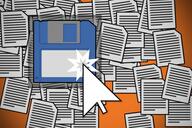You have /5 articles left.
Sign up for a free account or log in.
As we’ve moved largely to online delivery for our courses, there has been an increased concern around academic integrity and cheating -- students, the narrative goes, will take advantage of this move online to cheat when they might otherwise not. We must, common wisdom tells us, be ever-vigilant in the name of rigor. I am grateful to Thomas J. Tobin for his insight and perspective on this issue, originally shared on the POD Listserv and allowing it to be reprinted here. It deserves a larger audience. -- Lee Skallerup Bessette
There is a fear among many newly remote instructors about the possibility of students cheating in an environment that may be unfamiliar to instructors and learners alike. What's on the rise is not academic dishonesty, but suddenly online instructors' fear of losing control over the conditions under which assessments are handled.
Students are not out there cheating any more than they usually do, although one thing that could increase cheating is putting students into a bind where they get tempted -- you know, like moving everyone to a hastily constructed online environment with new rules and social norms. Something like that.
Put plainly, students are most tempted to act dishonestly when they feel anxiety and pressure. Most don't act on those temptations regularly, but we all have our tipping points. The current shift to remote instruction can create both anxiety and pressure. The best thing that we can all do, regardless of the subjects we teach or support, is to offer students options, voices and choices.
- Lower time pressure: don't put time limits on your online activities, including exams.
- Lower due-date pressure: allow late submissions, even if you lower the grade for such things (I don't, but do like you do).
- Lower grade anxiety: spread out the points across activities and avoid having one big thing carry enough points to possibly wreck a final grade. Or, consider minimalist grading (hi, Peter Elbow), specifications grading (hi, Linda Nilson) or ungrading (hi, Jesse Stommel).
- Lower communication anxiety: Explicitly tell students that you are open to hearing about the challenges they face, and give them multiple avenues for making contact if things don't go as planned. Actually say that you are willing to accept late work, offer extensions, think of accepting revised work -- whatever you are willing to do, say it, so that students do not feel that you are unapproachable and they have no choice but to "make the grade" any way they can.
This can be a hard conversation to have with faculty colleagues. They know the statistic that more than two-thirds of students have cheated on an activity at some point during their studies. But they don't know that this ratio measures whether everyone has ever acted dishonestly. Don't tell my alma mater, but I used a not-allowed answer key for a test when I was a sophomore back in the Mesozoic Era. I ran out of time for studying, and the exam was worth 40 percent of the final grade. Heck yeah, I cheated on that one.
The real number to think about is that in your specific course, in this specific semester, we're really talking about 1 to 2 percent of interactions seeing dishonest conduct. The vast majority of students, when we tell them what honest work and study look like, will do as we ask them to do.
That's not to say that we shouldn't enact academic integrity penalties and policies, but saying no has to be accompanied by what yes looks like, too. Here is a white paper to help with your approach during COVID-19 times (PDF, estimated reading time, 15 minutes); it was written in 2017, and the approach in it remains a useful path for me, my students and my colleagues.
Thomas J. Tobin is the program area director for distance teaching and learning on the Learning Design, Development & Innovation (LDDI) team at the University of Wisconsin at Madison, as well as an internationally recognized speaker and author on topics related to quality in technology-enhanced education, especially copyright, evaluation of teaching practice, academic integrity and accessibility/universal design for learning.




